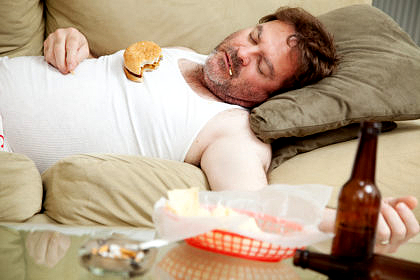7 Habits That May Be Sabotaging Your Health

Bad health begins with bad habits and when you learn about the seven habits that may be sabotaging your health, you can turn those bad habits into good habits and begin to turn your life around.
Habit # 1: Eating too much sugar
I believe this is the most common habit that is sabotaging our health because it is everywhere! It’s not just in our candies, cakes, cookies, pies and ice cream. It is in our breads, condiments and products marketed as health foods.
Sugar plays a big role in various chronic diseases today, such as type 2 diabetes, heart disease, obesity, and cancer. Excess sugar intake is an extremely bad habit that can be sabotaging all your efforts to try to lose weight, sleep well, and feel better. Sugar also fights with receptors that take in vitamins and minerals and therefore acts as an anti-nutrient.
Today, Americans are addicted to sugar. Two hundred years ago, the average American ate only 2 pounds of sugar per year. Today, the average American consumes almost 152 pounds of sugar per year. That’s 6 cups in one week!
Health Tip #1. Eat less sugar and eat less foods that turn to sugar such as grains and pasta.
Habit # 2: Consuming too much processed or fast food
We live in a society where it is expected to get things fast and easy and that includes our food. We are too busy to take the extra time required to shop and prepare our meals at home. It is so much more convenient to get something quick from the drive thru window at our favorite fast food joint on the way home from work.
Traditional diets of whole foods, which were locally-raised and consumed fresh have been replaced by diets of stripped, depleted, highly processed foods. This increased intake of low nutrition foods is creating a growth of chronic diseases. Many of these foods contain bad fats in the form of polyunsaturated fatty acid (PUFAs) damage the cells and drive inflammation and oxidative stress (production of free radicals). These fats in the form of vegetable oils, are found in the majority of our processed foods. Sugars combined with these bad fats increase LDL particles (commonly known as bad cholesterol) that drive inflammation.
Health Tip #2. Avoid eating processed foods and eat more whole foods. Incorporate good fats in your diet, such as coconut oil, egg yolks, flax oil, olive oil and butter.
Habit # 3: Not drinking enough water
Water is the very essence of life! Our body is 70% water. To maintain this vital balance, we need to consume it every day. Many of us fail to drink adequate quantities of the best quality of water for the body to absorb nutrients and excrete wastes. Aging and associated degenerative processes involve progressive dehydration. Symptoms of dehydration include joint inflammation, back problems, mental fogginess, asthma, high blood pressure, angina, multiple sclerosis and depression. Water is essential for a healthy body.
Unfortunately, finding good clean water is a challenge. What is the source of water most of us rely on? Household faucet-water supplied by our local utility company. Ordinary tap water contains minerals, sediment and chemicals. It can also have concentrations of heavy metals, chemical fertilizers and pesticides. The EPA has identified more than 80 unwanted substances that may be present in our water supply. According to the EPA, some of these pollutants could lead to cancer and other illnesses. Tap water is treated with chlorine, a harsh chemical, to destroy a variety of illness-causing bacteria. Consumption of chlorinated tap water can more than double the risk of bladder and rectal cancers in certain individuals.
Is bottled water an option? It may be better in some cases, but the problem with bottled water is the plastic it is stored in, and in a lot of cases it is just bottled tap water.
Health Tip #3. Invest in a good water purification system, such as a reverse osmosis system and drink plenty of water. A good rule of thumb is to drink half of your body weight in ounces. For example, if you are one hundred and fifty pounds, you would drink approximately seventy-five ounces of water every day.
Habit #4: Not getting enough sleep
Nearly one-third of Americans are sleep deprived. Factors that contribute to insomnia are lack of exercise, poor diet, caffeine, medications and various health disorders. Getting less than seven hours of sleep each night takes a more extreme toll on the body than most people realize. Inadequate amounts of sleep affects memory and decreases the immune system response.
We need sleep to rejuvenate our bodies. If you are not sleeping at least seven hours a night, which is almost impossible for many people, your body is not repairing itself. Determine and eliminate what’s preventing you from getting at least 7 hours of sleep.
In a lot of cases, incorporating better lifestyle habits naturally improve your quality of sleep.
Health Tip #4. Get at least seven hours of good quality sleep every night.
Habit #5: Ignoring your digestive system
Poor digestive health is an extremely common and most overlooked condition in this country, affecting about 70 million Americans. Signs of a poorly functioning digestive system include constipation, acid reflux and bloating. Poor gut health can lead to blood sugar problems, hormonal imbalances, infection, malnutrition, inflammation and weight gain. The proper care of the gut requires determining which foods to remove from the diet. Other nutritional strategies include: the removal of inappropriate organisms such as bacteria, parasites, fungus and yeast, replacement of digestive enzymes, HCL, bile and fiber, to thoroughly digest proteins, fats and essential nutrients, re-populate with ample probiotics to replace an overabundance of bad bacteria with good bacteria, and supporting regeneration and healing of the gastrointestinal mucosa.
Health Tip #6. Respect your digestive system. Include nutrients in your diet that repopulate the good bacteria in your gut, help heal and nourish the gut and eliminate waste in your body.
Habit #6: Taking unnecessary medications
First, my disclaimer. I am not telling you to stop your medications. I just want you to be aware that most medications are prescribed for conditions that can be eradicated with a healthier lifestyle. Establishing consistent, healthy habits may eventually decrease your need for prescription and over the counter medications for pain and other chronic symptoms.
All medications have side effects, and the dangers of these drugs are mounting. In 2005, there were 1,250,377 emergency room visits due to adverse reactions; in 2009, the number had climbed to 2,287,273 – an increase of 83%!
Health Tip #6. Check with your natural healthcare practitioner to see if there’s a natural effective solution to your health problems.
Habit #7: Holding on to unsupportive beliefs
Our bodies not only adversely respond to a toxic or unbalanced physical environment, but they also respond to unhealthy or unsupportive beliefs. These thoughts can affect our health physically and emotionally. We have the opportunity to play a part in our own healing with our thoughts.
Our beliefs direct our choices, behaviors, and actions. We need to evaluate those old unsupportive belief systems that are running in our minds, preventing us from getting what we want. You are personally creating your life with your thoughts. If you are not happy with your results, analyze your thoughts. Success comes from being aware of your beliefs and taking responsibility of your actions.
Health Tip #7. Monitor your thoughts daily and start to replace those negative, self-limiting beliefs with more supportive, affirmative thoughts.
To learn more about how you can incorporate more healthy strategies in your life, join my mailing list get your free copy of the Food Shopping Guide. Start incorporating these habits today for a healthier and happier life.



